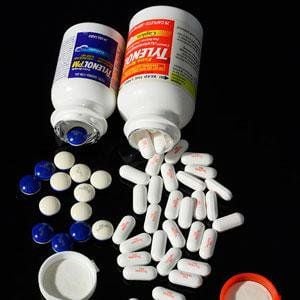Transamin has shown effectiveness in treating numerous cases of excessive bleeding caused by increased systemic fibrinolysis. What is Transamin 250mg?
1. Uses of Transamin
Transamin, containing tranexamic acid, is indicated for the prevention of bleeding associated with increased systemic fibrinolysis:
- Leukemia
- Aplastic anemia
- Purpura
- Abnormal bleeding during or after surgery
Besides, Transamin can be used to treat abnormal bleeding due to local fibrinolysis in the following cases:
- Pulmonary hemorrhage
- Epistaxis
- Metrorrhagia
- Hematuria
- Abnormal bleeding during or after prostate surgery
Furthermore, there may be off-label uses for Transamin that are not included in the official prescribing information. However, these should only be prescribed by your doctor.
2. How to use Transamin?
Transamin is formulated in multiple dosage forms, including:
- Transamin 250mg capsules: containing 250mg of tranexamic acid.
- Transamin 500mg tablets: containing 500mg of tranexamic acid.
- Tranexamic acid 250mg/5ml injection.
Dosage of Transamin is divided according to different subjects:
For adults:
- Oral: Oral administration: Initiate therapy with 750-2000mg daily, divided into 3-4 doses. Dosage may be adjusted based on age and symptoms of the disease. For menorrhagia, a dose of 1 gram daily is recommended.
- Intravenous or intramuscular injection: Typically, 250-500mg daily in 1-2 divided doses. For surgical bleeding or conditions associated with local fibrinolysis, 500-100mg intravenous bolus or 500-2500mg intravenous infusion may be administered as directed.
- For children: Pediatric dosing has not been established; therefore, consult a healthcare provider prior to use.
In addition, if you are using the tablet form, you should take it with food or during a meal. Do not crush, break, or chew the tablet.Injectable forms are administered by a healthcare provider via intravenous or intramuscular routes. Adhere strictly to your doctor's prescribed dosage and duration of treatment. Transamin can be taken with or without food, as directed.
Consistent use of Transamin is recommended to maximize benefits from it and discontinue use if new symptoms arise or if there is no improvement after 7 days. Absolutely do not overuse the drug for a long time. This does not make the patient's condition improve better but also increases the risk of unwanted side effects.
3. Side effects of Transamin
Adverse effects associated with Transamin use may include:
- Nausea, vomiting
- Diarrhea
- Loss of appetite
- Drowsiness
- Chest pain
- Jaw pain
- Left arm pain
- Sudden dyspnea
- Coughing up blood
- Fainting
Before prescribing the drug, the doctor always considers the benefits and effectiveness of Transamin. When using Transamin, there may still be unwanted side effects. Therefore, when there are signs of unusual symptoms, especially when there is a serious allergic reaction with accompanying signs such as severe dizziness, difficulty breathing, rash, swelling or itching of the face, throat, tongue, ..., in this case, the patient needs to notify the doctor or nurse immediately for immediate medical intervention.
4. Important considerations when using Transamin
Important considerations when using Transamin include:
- Report a history of allergy to Transamin or any other allergies. Transamin may contain ingredients that don't work and could cause an allergic reaction or other serious problems.
- Notice the medications you are taking including prescription, nonprescription, herbal and dietary supplements.
- Transamin is contraindicated in patients with thrombosis, patients with a history of hypersensitivity to any component of the drug.
- There are not enough studies to determine the risks of using Transamin during pregnancy and lactation. Therefore, before using Transamin, always consult with your doctor to weigh the benefits and risks.
If you forget a dose of Transamin, take it as soon as you can. But if it's almost time for your next dose, just skip the one you missed and take your next dose as usual. Don't take more than the prescribed dose. Overdose or accidental ingestion of Transamin can cause serious side effects such as nausea, vomiting, abdominal pain, difficulty breathing, and fainting...
5. Drug interactions
Drug interactions can reduce the effectiveness of Transamin or increase the risk of side effects. Inform your doctor about all other medications you are taking, including over-the-counter drugs, vitamins, prescription drugs, and herbal products. Do not start, stop, or change the dosage of any medication without your doctor's approval.
Potential drug interactions with Transamin include:
- Blood thinners or anticoagulants such as heparin, warfarin, etc.
- Medications to prevent bleeding, including factor IX complex, coagulation inhibitors, etc.
- Coagulants
- Batroxobin
- Estrogen, hormonal contraceptives such as pills, intrauterine devices (IUDs), and patches.
6. How to preserve Transamin drug
Transamin should be stored in a cool, dry place, protected from light, at a temperature not exceeding 30°C. Avoid freezing or storing near heat sources. Storage conditions may vary for different pharmaceutical products, so it is essential to adhere to the specific storage instructions provided on the product label or consult with a pharmacist. Keep Transamin out of the reach of children and pets. Expired or damaged medication should be disposed of safely according to local regulations. Do not flush unused medication down the toilet or pour it into a drain unless instructed to do so.
To arrange an appointment, please call HOTLINE or make your reservation directly HERE. You may also download the MyVinmec app to schedule appointments faster and manage your reservations more conveniently.













